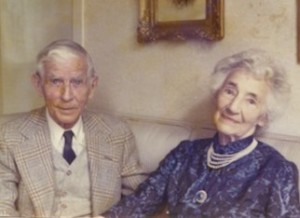The search of Raoul Wallenberg
“I first met my husband’s parents, Maj and Fredrik von Dardel, when Guy and I were about to be married, in 1949. For thirty long years I witnessed firsthand the old couple’s struggle to pursue all possible leads about their first-born son, Raoul Wallenberg. And he was truly “their” son – Fredrik’s loyalty and devotion to Raoul was as strong as for his other children, Nina and Guy.
It took an enormous daily effort to keep track of all the contacts and petitions, new and old pieces of information that needed to be itimized and catalogued before the age of computers. It is due to Fredrik’s diligent efforts, with close assistance by Maj and Nina, that we now have this very important historical document which allows a glimpse into Maj and Fredrik’s private world, their hard work, the many false hopes and disappointments they suffered and the toll the uncertainty about Raoul’s fate took on their lives.
I later watched my husband Guy (and his sister Nina) carry on their parents’ work with the same devotion and with very similar struggles.
First and foremost, however, this record represents a triumph of the will and I treasure it as a moving testament to the unshakable bonds of love and family.
Matilda von Dardel”
The diary is in swedish, in .pdf:
Fredrik von Dardel
Fredrik Elias August, b. 28 Aug 1885,d.1979 Maria Sophia (Maj) von Dardel, né Wising, b. November 5, 1891, d. 1979

He studied law at Uppsala University and received his degree in 1908. von Dardel became Chief Administrative Officer of Karolinska Hospital in 1940. He retired in 1950; married to Maj Wallenberg, né Wising, in 1918. They had two children, Guy (b. 1919) and Nina (b. 1921) and together raised Maj’s son, Raoul G. Wallenberg (b. 1912), from her first marriage.
By all accounts, Fredrik von Dardel and Raoul Wallenberg, were very close. When his stepson turned eighteen, Fredrik offered Raoul to address him by his first name. Wallenberg asked to call him “Pappa” (Dad) instead.
After Raoul’s disappearance in 1945, Fredrik von Dardel took on the role of “ombudsman” for his affairs. For three decades he worked tirelessly to obtain full information about his stepson’s fate, gathering and analysing witness testimonies, and keeping in close contact with the Swedish Foreign Office to press diplomats to continue to pursue the case.
In 1970 he published a book entitled “Facts Around A Fate” (“Fakta kring ett öde”, Proprius Förlag) which outlined many of the most important witness testimonies in the Wallenberg investigation for the first time in public.
Fredrik von Dardel also kept detailed notes and a diary, chronicling the actions taken by the family on Raoul’s behalf.
At age 90, two years before his death, he petitioned the Swedish government to lift the secrecy restrictions that governed documentation in the Wallenberg case. The government instead decided to merely reduce the secrecy requirement from fifty to thirty years, which kept many important documents inaccessible to the family.
Maria Sophia (Maj) von Dardel
Daughter of prominent Swedish physician Per Wising. Married Raoul Oscar Wallenberg in 1911. Her husband fell ill and died of cancer before the birth of their only child, Raoul Gustaf Wallenberg, who was born on August 4, 1912.
After raising her son alone for six years, she married Fredrik von Dardel, a lawyer, in 1918. After Raoul’s disappearance in 1945, she and her husband, as well as their two children, Guy and Nina, devoted their lives to secure his release from Soviet captivity.
Shortly after Raoul Wallenberg’s disappearance, she met with the Soviet Ambassador in Stockholm, Alexandra Kollontai. Kollontai told Maj von Dardel that her son had been detained by Soviet forces but that he was well and that there was no cause for worry.
Through three decades, Maj kept up far a reaching correspondence, sending personal appeals to international political leaders, including Josef Stalin and Eleanor Roosevelt, as well as human rights organisations and activists such as Simon Wiesenthal.
In 1973 she wrote a letter to U.S. Secretary of State Henry Kissinger asking him to bring the influence of the U.S. government to bear in the case of her son, since his mission had been in large part conceived and supported by official U.S. entities such as the War Refugee Board. Kissinger never responded, even though the matter had been brought to his attention by his close associate Thomas Pickering.